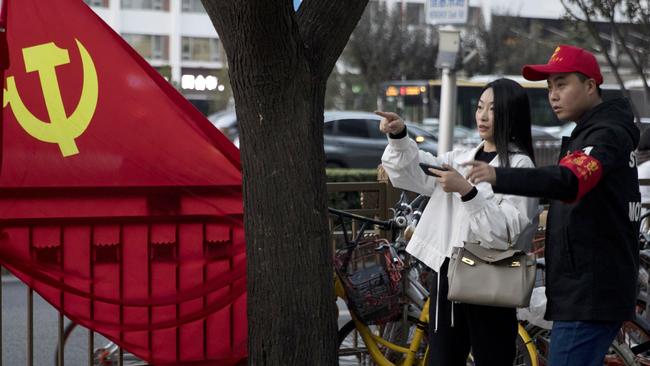Beijing’s goal of global domination
America’s problems are pluses for China has Xi Jinping position his nation to be the world’s most influential power.

The contrast is stark, although the core slogan sounds surprisingly similar: Donald Trump wanting to Make America Great Again; Xi Jinping wanting to Rejuvenate China.
But Xi is not content to rest there. He also aims to seize this rare opportunity of an America in retreat to reshape the global hierarchy through a suite of ambitious moves that would vault China to replace the US as the most influential international power of our day.
Such a breathtakingly bold move, if he can pull it off, also will reverberate domestically to ensure his supremacy for as long as he wishes to exercise it.
What will Xi’s world look like?
In stark contrast with Trump, he is seizing hold of the language of contemporary global diplomacy and making it his own.
Human rights? He is their champion. He told the UN organisations headquartered in Geneva, including the Human Rights office, earlier this year: “The sovereignty and dignity of all countries … must be respected, their internal affairs allow no interference …”
Xi’s key phrase in this area is that China is building “a community of shared destiny”, through which concept — however ill-defined — it is positioning itself to take a leading role in the Human Rights Council.
He stresses economic development is the key element in promoting human rights, a concept through which China wishes to change the whole human rights framework.
Globalisation? He is its foremost campaigner. The applause for Xi from the global corporate elite has grown only louder since his adulatory reception at Davos in January, when he praised “inclusive globalisation” and “economic globalisation”.
“The problems troubling the world are not caused by globalisation … Countries should view their own interest in the broader context and refrain from pursuing their own interests at the expense of others,” he said.
The environment? He is its chief defender. “The Paris (climate change) Agreement is a milestone,” he said. “We must ensure this endeavour is not derailed … We have only one homeland.”
Aid? He is the most generous giver. A new report from AidData, a US-based project that includes Harvard University, says China soon could replace the US as the biggest donor in the developing world.
This century so far, the report says, the US is only slightly ahead of China, though this includes aggressive commercially oriented programs.
China is planning to fill the funding gap as Trump quits UNESCO and to reap the “soft power” kudos.
Governance? He is the greatest expert. His book on the topic, a compilation of 79 speeches, has been translated by the Chinese authorities into 22 languages, with 6.4 million copies distributed around the world. Xinhua stresses that “Chinese proposals and wisdom” on pushing governance reform China-style “are becoming the consensus of the international community”.
Besides this rhetorical adroitness, Xi is also moving rapidly to sew up China’s more concrete supremacy, both economic and geopolitical, throughout Asia and beyond, via his Belt and Road Initiative.
This scheme, albeit eye-wateringly expensive, is founded on loans not grants. It will tie much of the region to Beijing for decades as recipients seek constantly to solicit projects or to renegotiate their BRI terms. The BRI ensures that not only all roads but also all rail, air and sea routes, all compliance arrangements and technical standards, all telecommunications carriers, all leading internet platforms, lead not to Rome, as of old, but to Beijing as Eurasia’s connectivity hub.
Xi has pushed China to the leadership of the Brazil, Russia, India, China and South Africa grouping, of the Shanghai Co-operation Organisation that straddles Eurasia, of the under-negotiation Regional Economic Comprehensive Partnership.
Strategically, he has succeeded in largely silencing regional opposition to China’s control of the South China Sea through its construction of military outposts, and has considerably enhanced the potential of the People’s Liberation Army through restructuring it on more flexible, modern lines.
He has built a close, functional relationship with Russia’s Vladimir Putin, but with himself clearly as the senior partner.
The international dimension of China enjoying a “golden age” under Xi strongly evokes a return to a form of tribute-state relationships, an image conjured by the grand BRI launch in Beijing and by pre-party-congress TV specials showing Xi greeting a stream of foreign leaders being received by him.
However, Xi’s world is not yet a done deal. Since he came to office, every near neighbour with the exceptions of Pakistan, Russia, Cambodia and Laos has come into conflict with China, although most disputes have been patched up for now.
This year’s smash-hit movie Wolf Warrior 2, starring a Chinese Rambo rescuing altruistic Chinese from evil Western mercenaries in Africa, reveals the core domestic driver of such frenetic international activity.
Its underlying message, stated at the end of the film, is one of Beijing’s new-found global reach, voiced over the image of a Chinese passport: “Citizens of the People’s Republic of China: When you encounter danger in a foreign land, do not give up! Please remember, at your back stands a strong motherland.”




To join the conversation, please log in. Don't have an account? Register
Join the conversation, you are commenting as Logout